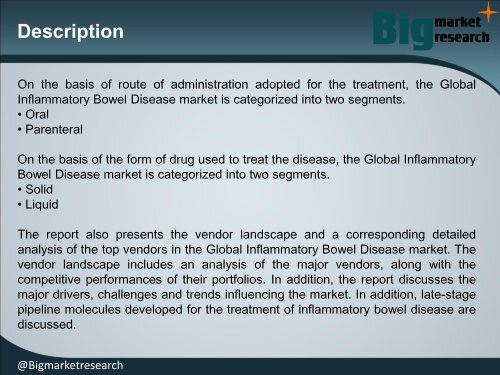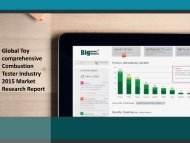Global Inflammatory Bowel Disease Market 2015-2019
Inflammatory bowel disease is a condition includes a group of autoimmune diseases such as Crohn's disease and ulcerative colitis. It causes chronic inflammation of a specific part or the entire GI tract. Both Crohn's disease and ulcerative colitis include symptoms such as severe persistent diarrhea, abdominal cramps and pain, rectal bleeding, fatigue, and weight loss. Inflammatory bowel disease can also prove to be life-threatening for the patients. Ulcerative colitis generally affects the colon, where inflammation and ulcers develop in the innermost lining of the colon and the rectum of a patient. Crohn's disease causes inflammation of the lining of the GI tract. The inflammation in Crohn's disease affects various areas of the GI tract such as the large intestine and small intestine, or both. Inflammatory bowel disease is a chronic medical condition, which has no permanent cure and demands a lifetime of treatment and management. The preferred treatment options include anti-inflammatory steroidal products and immuno-suppressive agents such as the TNF-α inhibitors. Analysts forecast the Global Inflammatory Bowel Disease market to grow at a CAGR of 3.95 percent over the period 2014-2019. Read more details at: http://www.bigmarketresearch.com/global-inflammatory-bowel-disease-2015-2019-market
Inflammatory bowel disease is a condition includes a group of autoimmune diseases such as Crohn's disease and ulcerative colitis. It causes chronic inflammation of a specific part or the entire GI tract. Both Crohn's disease and ulcerative colitis include symptoms such as severe persistent diarrhea, abdominal cramps and pain, rectal bleeding, fatigue, and weight loss. Inflammatory bowel disease can also prove to be life-threatening for the patients. Ulcerative colitis generally affects the colon, where inflammation and ulcers develop in the innermost lining of the colon and the rectum of a patient. Crohn's disease causes inflammation of the lining of the GI tract. The inflammation in Crohn's disease affects various areas of the GI tract such as the large intestine and small intestine, or both. Inflammatory bowel disease is a chronic medical condition, which has no permanent cure and demands a lifetime of treatment and management. The preferred treatment options include anti-inflammatory steroidal products and immuno-suppressive agents such as the TNF-α inhibitors.
Analysts forecast the Global Inflammatory Bowel Disease market to grow at a CAGR of 3.95 percent over the period 2014-2019.
Read more details at: http://www.bigmarketresearch.com/global-inflammatory-bowel-disease-2015-2019-market
Create successful ePaper yourself
Turn your PDF publications into a flip-book with our unique Google optimized e-Paper software.
Key Benefits<br />
Description<br />
On the basis of route of administration adopted for the treatment, the <strong>Global</strong><br />
<strong>Inflammatory</strong> <strong>Bowel</strong> <strong>Disease</strong> market is categorized into two segments.<br />
• Oral<br />
• Parenteral<br />
On the basis of the form of drug used to treat the disease, the <strong>Global</strong> <strong>Inflammatory</strong><br />
<strong>Bowel</strong> <strong>Disease</strong> market is categorized into two segments.<br />
• Solid<br />
• Liquid<br />
The report also presents the vendor landscape and a corresponding detailed<br />
analysis of the top vendors in the <strong>Global</strong> <strong>Inflammatory</strong> <strong>Bowel</strong> <strong>Disease</strong> market. The<br />
vendor landscape includes an analysis of the major vendors, along with the<br />
competitive performances of their portfolios. In addition, the report discusses the<br />
major drivers, challenges and trends influencing the market. In addition, late-stage<br />
pipeline molecules developed for the treatment of inflammatory bowel disease are<br />
discussed.<br />
@Bigmarketresearch

















